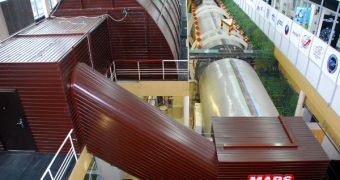As experts begin to probe the issues raised by a potential trip to Mars in more depth, they start realizing that the actual flight itself and the problems related to constructing a proper vehicle to get there and back are only minor, in comparison to other issues. One of the problems is how nearly two years of cosmic travels would affect the crew of a space vehicle. Another one, just recently raised by scientists, relates to the dangers posed by microbes and bacteria that the astronauts may involuntarily take with them to the Red Planet.
Cross-contamination issues aside, microorganisms could wreck havoc in a crew, by acting in a double, roundabout manner. First, an infection would considerably weaken the space travelers' immune systems, which would make them more susceptible to outside influences. Secondly, the virulence and growth of microbes is significantly boosted, healthcare experts say. Even minor infections are something to be taken very seriously in space, as the astronauts have no way of getting off and going to a hospital if the need arises.
“When people think of space travel, often the vast distances are what come to mind first, but even after we figure out a way to cover these distances in a reasonable amount of time, we still need to figure out how astronauts are going to overcome disease and sickness,” French researcher Jean-Pol Frippiat, from the Nancy University, in France, explains. He is also one of the co-authors of a new report on the matter, which appears in the latest issue of The Journal of Leukocyte Biology. The team reveals in the paper that microgravity has an unwanted effect on pathogens such as Salmonella, E. coli and Staphylococcus. Exposure to this environment considerably boosts their virulence.
“As clearly outlined by the researchers, we are unlikely to remain healthy when leaving earth for prolonged periods. Unfortunately, because spacecraft technology is way ahead of our understanding of how to maintain human health, disease-free survival after reaching Mars or establishing a colony on the Moon may be problematic,” The Journal of Leukocyte Biology Editor-in-Chief, Luis Montaner, adds. Experts Nathan Gueguinou, Cecile Huin-Schohn, Matthieu Bascove, Jean-Luc Bueb, Eric Tschirhart, and Christine Legrand-Frossi have also participated in the new report, which is entitled “Could spaceflight-associated immune system weakening preclude the expansion of human presence beyond Earth's orbit?”

 14 DAY TRIAL //
14 DAY TRIAL //